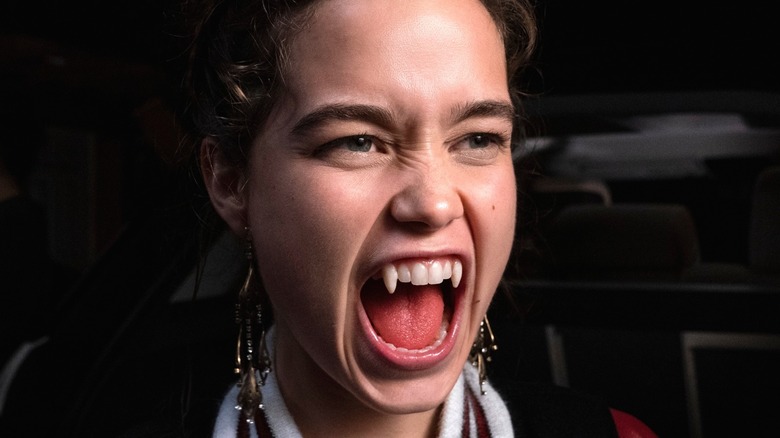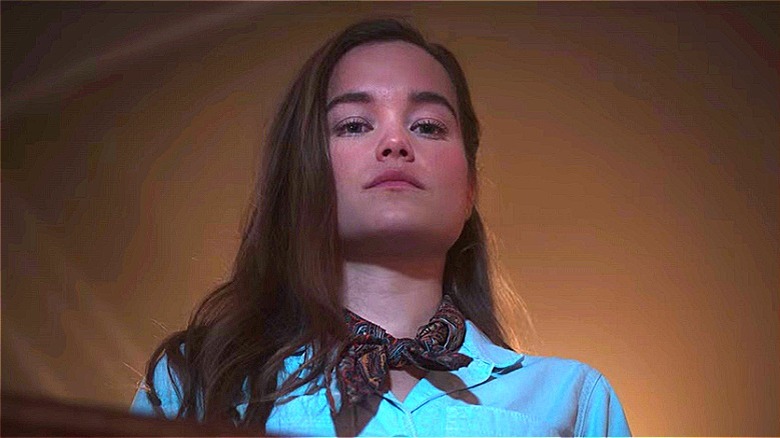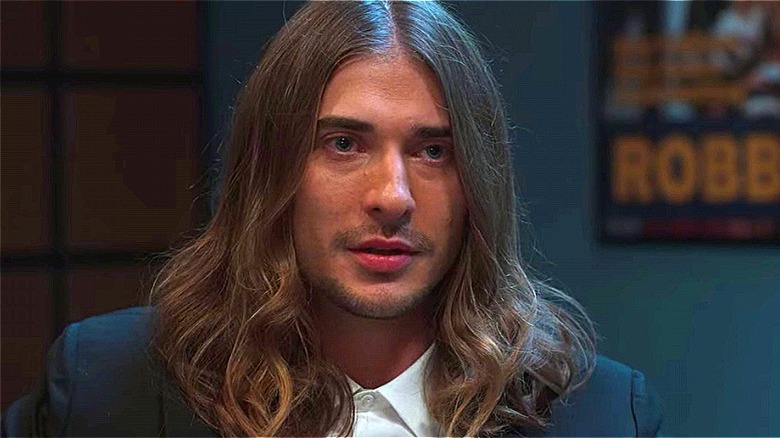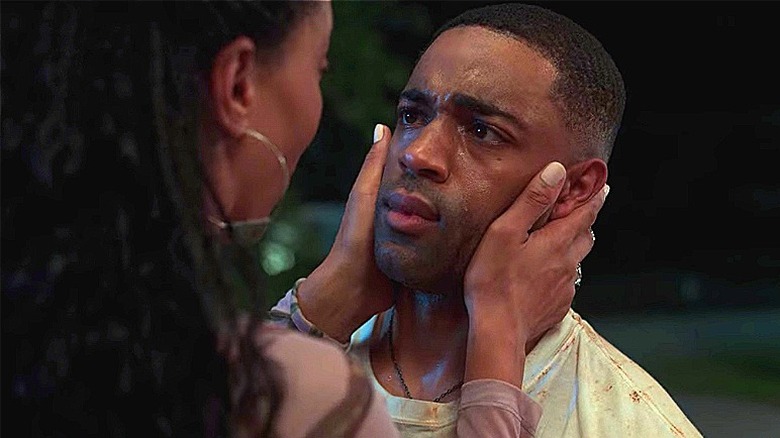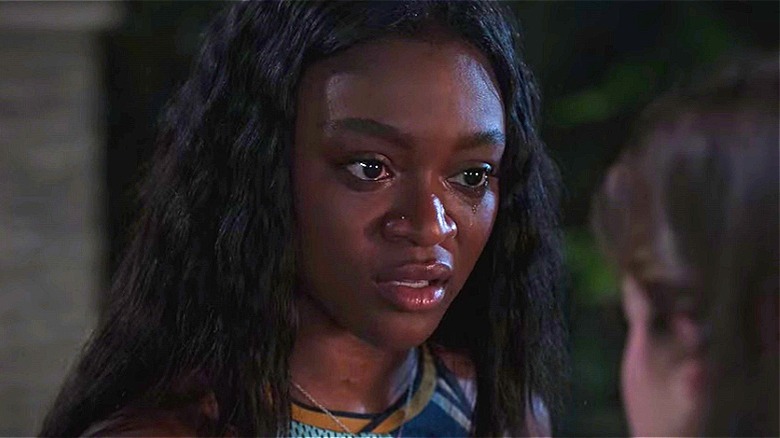The Ending Of First Kill Season 1 Explained
Upon watching Netflix's new vampire romance "First Kill," the connections to "Romeo and Juliet" are impossible to ignore. Teenagers Calliope (Imani Lewis) and Juliette (Sarah Catherine Hook) are on opposite sides of a war between vampires and humans, and defy their parents when they fall in love. You know the drill.
But where "First Kill" lacks in subtlety, it makes up for in content. The story not only lends itself well to the bloody tropes of vampiric love, but also gives representation where there historically has not been a lot. Adapted from V.E. Schwab's short story from anthology series "Vampires Never Get Old: Tales with Fresh Bite," the writer was more than happy to see her work come to the small screen. "[What] is probably the thing I'm most proud of [about First Kill], is that it's campy and it's fun but also at the center of it are two queer girls and it's not about them being queer," Schwab told Newsweek. That is to say, in "First Kill," it isn't prejudice against queerness that threatens to tear the couple apart, but prejudice against vampires. Calliope and Juliette must fight for their relationship tooth and nail, making the audience wonder, in the last episode, if love is really all you need.
Here's how it all plays out in the finale, and what it means.
Juliette finally comes into her own
Like any teenager, Juliette struggles with her identity. The young vampire is on the cusp of womanhood, and in her family, that means making her first kill. But as any high schooler will tell you, it's not that easy to become self-actualized. Juliette feels uncomfortable in her own skin, unsure of how she fits into her family's legacy. Making her first kill is certainly a step in the right direction, as far as getting a hang of this vampire thing goes, but Juliette still struggles with the rivalry between her and her bloodthirsty older sister Elinor (Gracie Dzienny).
It's only in the final episode when Juliette finds the depths of Elinor's depravity and realizes that she must be stopped once and for all. After a tragic turn of events, it becomes clear that Elinor was instrumental in Theo's downfall. Unable to let Elinor get away with it, Juliette leads the police to her sister's storage locker where she had been keeping all the evidence of the men she has killed. In an extremely open and shut case, Elinor is locked up for good with even their mother Margot (Elizabeth Mitchell) leaving her to rot.
This gives way to Juliette's full arc as a character. She finally accepts who she is as a vampire, but also acknowledges that her compassion is an asset, not a liability. Juliette becomes empowered in defeating Elinor the right way. She finally finds that there is a place for her in this world.
Justice for Oliver
Being an outcast is well-traversed territory for genre TV shows. Juliette particularly feels at odds because she can't be honest about how she feels about vampirism. This is a sentiment shared by her older brother Oliver (Dylan McNamara). Exiled from the family five years beforehand, because of his alleged macabre behavior, Juliette's older brother is at first painted as a psychopath. His parents want nothing to do with them, while interestingly have no problem with Elinor's appetite.
This inconsistency is finally clarified after Elinor's arrest for murder. She has ended up right where Oliver wants her, alone just as he was for much as his life. After posing as Elinor's attorney, Oliver finally gets Elinor to admit the truth — which is that she was the mastermind behind Oliver's fall. Because of her unprecedented hypnotic powers, Elinor was able to frame Oliver for crimes that were initially her idea. She forced him to kill animals as well as their own therapist only because it pleased her to do so. It also pleased her to have him thrown out of the family.
As yet another one of Elinor's victims, Oliver's bitterness extends to everyone — besides Juliette. The two are kindred spirits. Both feel like outcasts in their own family and become allies against Elinor. Elinor may be put away, but this is only the beginning of Oliver's plans. His twin's sins against him were too far and too many. Now Oliver is ruled by revenge, an inevitable outcome after everything he has been through.
Theo faces undeniable crossroads
Cal and Juliette's relationship is not the only obstacle the Burns clan has to face. In an attempt to save Theo's life after an encounter with Elinor, Juliette inadvertently turns Theo into a vampire. As one can expect, this does not go over well with his family. Years of upbringing cannot erase prejudice, and the patriarch of the family is unable to see his son as a person anymore. Jack (Jason R. Moore) proclaims his son a monster in one of the most heartbreaking displays of parental rejection imaginable.
Of all the characters in this season, Theo experiences the biggest change, with him being forced to transition in something he was raised to hate. But it is Talia's (Aubin Wise) reaction that is the most surprising. Arguably one of the most hard-lined monster killers, Talia absolutely forbids Cal to continue a relationship with Juliette. But when she sees her adopted son struggle, she reaches her breaking point. Theo is and will always be her son, causing her to also break away from the family's cause. She frees Theo from the threat of execution and takes him to the only person who can teach him about his new life: Oliver. This is startling for many reasons. Talia seemed intractable in her hatred for vampires, but in reality, if there is one thing that could ever change that, it is a mother's love. This gives Theo the strength to carry on and will be decidedly interesting storyline to follow should "First Kill" get a Season 2.
True love does not conquer all
When the saga of Juliette and Cal first starts, it is a thinly veiled reference to "Romeo and Juliet" — two houses, both alike in dignity, but with a major bone to pick. This makes the attraction between the vampire and the monster hunter even more passionate. But as with many stories of young love, it burns hot and flames out quickly. Their differences seem so unsurmountable that even teenage hormones cannot overcome them.
Cal spends the season rebelling against her upbringing, considering whether it may be possible for vampires to be gentle and kind. However, Juliette's final act of the season seals the fate of the couple. Her attempt to save Theo's life by turning him into a vampire is the nail in the coffin for the relationship. Even though she had the best of intentions, Cal cannot accept that Juliette's nature was the reason for Theo being excommunicated from the family.
Though Juliette has made serious steps into self-acceptance, Cal seems to backslide. She reverts to how she was at the beginning of the season. Her prejudices about vampires return, vowing to not only end the relationship but actually kill Juliette once and for all. This may be Cal's way of coping with the loss of her brother, but it is also calls back to the inspiration for the series. Though Romeo and Juliet met death instead of a vicious break-up, the result is the same. Young love is volatile and often tragic.
